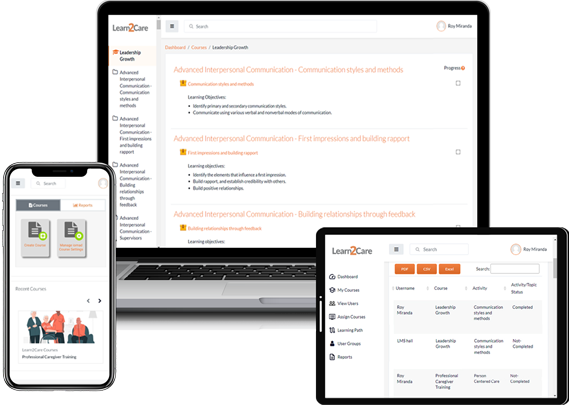
State Recommended
Courses

Caregiver
Training
Certification
Online
Courses
Hours of
Online
Content

Leadership
Courses
Title: Personal Care Assistant
Min. Initial Training Hours: 40
Continuing Education Hours: 8
State-Specific Curriculum Criteria: Yes
Personal Care Assistants (PCAs) in Georgia must adhere to stringent qualifications and acquire essential skills mandated by state regulations to provide exceptional care. This involves completing:
Note: We are committed to helping you stay informed and confident in your compliance efforts with the most accurate, up-to-date guidance we can provide. Our guides and resources are designed to support your training and compliance work, though state regulations may vary and change frequently. Please consult your state’s licensing or regulatory body for official guidance, publications, or requirements.

As Georgia’s senior population continues to boom, with over 1.6 million currently aged 65 and older and an anticipated 30% increase in the next decade, the demand for qualified caregivers is soaring. However, this surge in demand comes with many stringent state regulations aimed at safeguarding the welfare of seniors.
Caregivers and agencies must navigate these complex regulations to thrive in this environment.
Here’s a quick breakdown to ensure you’re on the right track:

Licensing is Mandatory
All agencies must be licensed, guaranteeing quality standards in training, supervision, and care delivery.

PCA Training is Crucial
Aides under licensed agencies must complete 40 hours overseen by registered nurses, adhering to state guidelines.

Know Your Scope
Tasks assigned to PCAs must strictly align with their training and demonstrated skills.

Companions vs. PCAs
Companions offer companionship and basic supervision but can only provide personal care if they’re qualified PCAs.

Optional Licensure
A license isn’t currently required if you work directly for individuals or families.
Ready to answer Georgia’s call for caregiving? Join the wave of compassionate caregivers and agencies making a difference in the lives of seniors. Remember, even if licensure isn’t mandatory, training is highly recommended and demonstrates your professionalism and dedication.

Equip caregivers with essential skills tailored to your agency's needs. Upskill administrators, managers, and office staff in leadership, communication, and team management.

230+ online caregiver and leadership training courses, with over 185 engaging hours of content to effectively equip and train your caregivers and home care agency staff.

Create personalized learning journeys, tailoring training to specific roles and expertise areas such as Alzheimer's and dementia care, infection control, and restorative care.

Easily track and report on assignments, completion status, quiz scores, and the individual caregiver's overall progress with our Progress Monitoring system.

Equip your caregivers with content that adheres to the US CMS HHA Conditions of Participation for home health aide services.

Upload your own training materials or empower your team to access built-in courses, streamlining essential training in one accessible location.

Experience seamless on-the-go learning for caregivers, providing unmatched flexibility in diverse work environments.
In Georgia, aspiring PCAs are required to undergo 40 hours of initial training, split into 20 hours completed initially and the remaining 20 hours within six months. However, their educational journey doesn't conclude there. To sustain their license and ensure ongoing skill development, PCAs must engage in 8 hours of annual continuing education.
Not completing the required training hours in Georgia can result in significant consequences. This includes being ineligible for employment in many home care agencies and Medicaid waiver programs, potential fines or penalties as per regulations, and limited career advancement opportunities due to the lack of demonstrated commitment and competency.
No, PCAs in Georgia are prohibited from performing tasks outside their scope of practice. Doing so could result in serious consequences such as endangering the client's well-being, facing legal action for unauthorized tasks, and potential disciplinary action including license suspension or revocation.
Staying informed is crucial! Here are some ways to stay up to date:
Here are the benefits of training certification for agencies and caregivers:
Overall, certification signifies a dedication to professionalism and high-quality care, enhancing your client's trust in your abilities.